Deck 20: Accounting and Finance in the International Business
Question
Question
Question
Question
Question
Question
Question
Question
Question
Question

Unlock Deck
Sign up to unlock the cards in this deck!
Unlock Deck
Unlock Deck
1/10
Play
Full screen (f)
Deck 20: Accounting and Finance in the International Business
1
Google and Its Tax Strategy
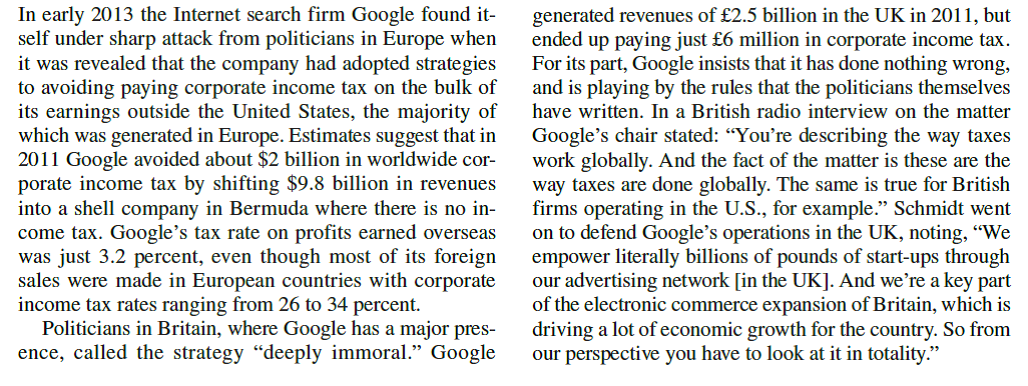
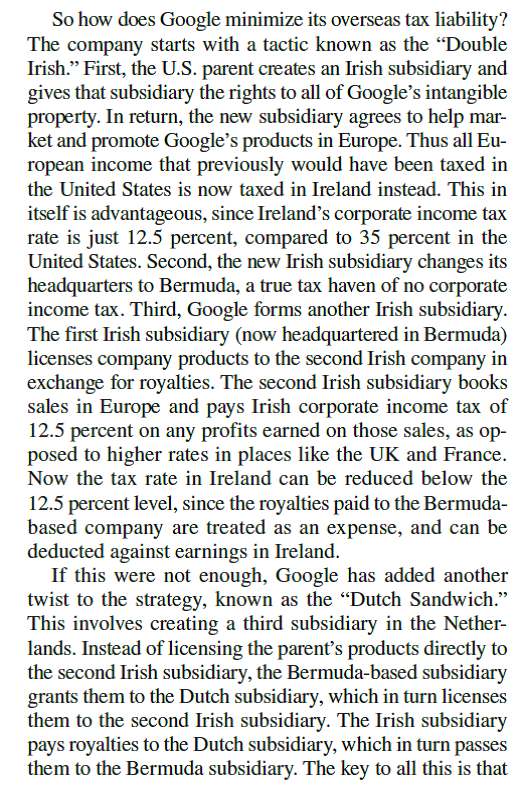
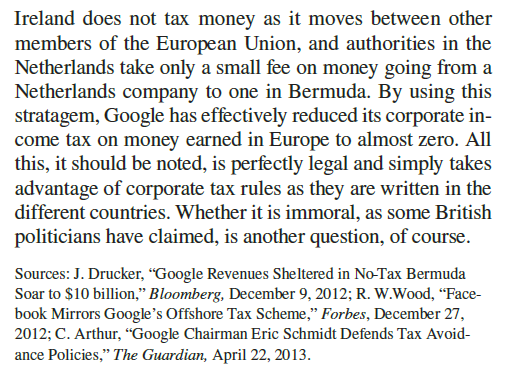
Do you think it is ethical for companies like Google to continue to use shell companies to avoid paying taxes in higher-tax-rate countries Is this practice always in the best interests of the company's shareholders and customers



Do you think it is ethical for companies like Google to continue to use shell companies to avoid paying taxes in higher-tax-rate countries Is this practice always in the best interests of the company's shareholders and customers
Governments collect taxes to meet expenditures for providing the residents of the country, services such as law and order, fire safety, water supply and other utilities, roads, education, healthcare, defense, transportation and so on. Large companies are able to operate in such an environment not only for the lucrative market, but also that they are able to attract talent who live in these countries. It is only fair that large companies contribute to the government, the taxes they should legitimately pay out of the profits they make.
Therefore, one can conclude that it is unethical for large companies such as GGLE to continue to use shell companies to avoid paying taxes in higher-tax-rate countries.
Such a practice may not always be in the interest of shareholders who may be located in the U.S. This is because unless the money comes into U.S., legitimate dividends cannot be paid to GGLE's shareholders. Such a practice may be in the interest of customers who may get products cheaper, as the money saved in taxes may be shared as price discount on GGLE's products.
These days many customers are particular in patronizing products of a company which are not only ethical and but also follow sustainable practices. Such customer segments may feel let down by GGLE's practices.
Therefore, one can conclude that it is unethical for large companies such as GGLE to continue to use shell companies to avoid paying taxes in higher-tax-rate countries.
Such a practice may not always be in the interest of shareholders who may be located in the U.S. This is because unless the money comes into U.S., legitimate dividends cannot be paid to GGLE's shareholders. Such a practice may be in the interest of customers who may get products cheaper, as the money saved in taxes may be shared as price discount on GGLE's products.
These days many customers are particular in patronizing products of a company which are not only ethical and but also follow sustainable practices. Such customer segments may feel let down by GGLE's practices.
2
Why do the accounting systems of different countries differ Why do these differences matter
The question asks the student to first, consider why different countries use different accounting systems. Second, it asks the student to consider why these differences are important. To begin, we will consider the first part.
Different countries employ different accounting systems because; accounting systems are result of a culture's evolution and needs. Therefore, one culture may demand different accounting information than another. These demands come from investors, banks, or the government itself.
The five specific factors that theorists believe dictate the accounting systems of a country. These are:
• Relationships between business and "providers of capital" (investors, banks, government): Assume that, the government is highly involved in business in a country (i.e. Sweden). This will shift accounting practices in favor of the needs of the government rather than individual investors.
• How the country interacts politically and economically with other countries. For instance, since the U.S. and Canada are closely tied in both of these aspects, these two countries have very similar accounting practices.
• Inflation rates affect how the country adjusts for inflation.
• Country's development level: In general, the more developed a nation, the more complicated its accounting systems.
• The overall culture: This can be discussed in light of the theory of "uncertainty avoidance," which refers to how comfortable a culture is with ambiguity. If a culture has a high tolerance for uncertainty, the accounting system will be simpler.
Now, moving on to the second part of the question, we will consider why these differences matter. These differences are significant, as we move toward a more global economy.
We must work toward creating standardized accounting practices so that we can compare companies and industries no matter how they stand in terms of the five factors above.
Different countries employ different accounting systems because; accounting systems are result of a culture's evolution and needs. Therefore, one culture may demand different accounting information than another. These demands come from investors, banks, or the government itself.
The five specific factors that theorists believe dictate the accounting systems of a country. These are:
• Relationships between business and "providers of capital" (investors, banks, government): Assume that, the government is highly involved in business in a country (i.e. Sweden). This will shift accounting practices in favor of the needs of the government rather than individual investors.
• How the country interacts politically and economically with other countries. For instance, since the U.S. and Canada are closely tied in both of these aspects, these two countries have very similar accounting practices.
• Inflation rates affect how the country adjusts for inflation.
• Country's development level: In general, the more developed a nation, the more complicated its accounting systems.
• The overall culture: This can be discussed in light of the theory of "uncertainty avoidance," which refers to how comfortable a culture is with ambiguity. If a culture has a high tolerance for uncertainty, the accounting system will be simpler.
Now, moving on to the second part of the question, we will consider why these differences matter. These differences are significant, as we move toward a more global economy.
We must work toward creating standardized accounting practices so that we can compare companies and industries no matter how they stand in terms of the five factors above.
3
Accounting and Finance in the International Business
Use the globalEDGE website (globaledge.msu.edu) to complete the following exercises:
The inflation rate of a country can affect financial planning in multinational corporations since the value of receivables in each country can face significant devaluation if the inflation rates are high. Your company has operations in the following countries: Belarus, Costa Rica, Finland, Iceland, Paraguay, Thailand, and Zimbabwe. Use the Country Comparator on the globalEDGE site to rank the risk of devaluation of your company's receivables from highest to lowest, based on the most recent data available for each country. What precautions can your company take in the countries at the top of this list to minimize the risk
Use the globalEDGE website (globaledge.msu.edu) to complete the following exercises:
The inflation rate of a country can affect financial planning in multinational corporations since the value of receivables in each country can face significant devaluation if the inflation rates are high. Your company has operations in the following countries: Belarus, Costa Rica, Finland, Iceland, Paraguay, Thailand, and Zimbabwe. Use the Country Comparator on the globalEDGE site to rank the risk of devaluation of your company's receivables from highest to lowest, based on the most recent data available for each country. What precautions can your company take in the countries at the top of this list to minimize the risk
NO ANSWER
4
Google and Its Tax Strategy
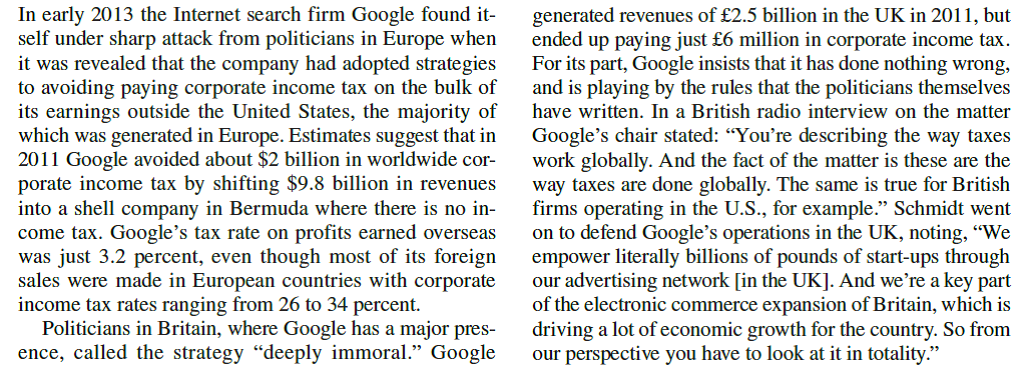
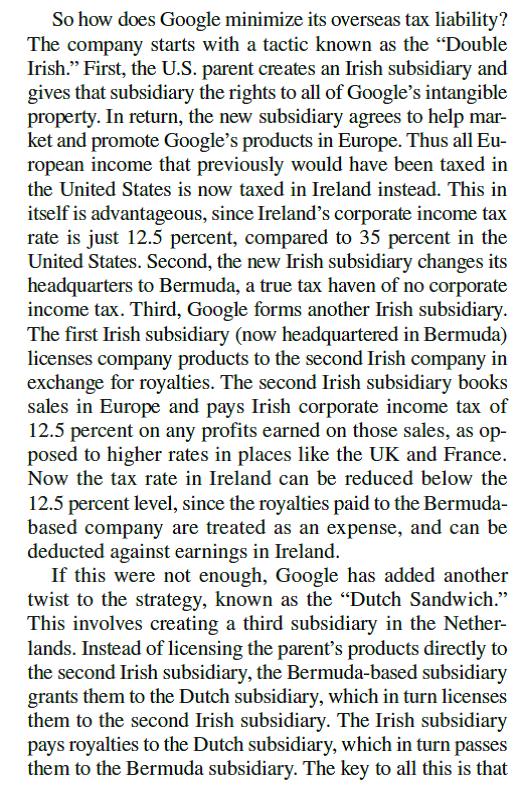
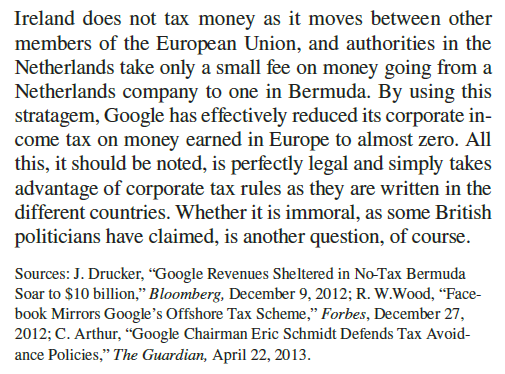
Should the "Double Irish" tactic be outlawed globally and, if so, how would you go about doing it



Should the "Double Irish" tactic be outlawed globally and, if so, how would you go about doing it

Unlock Deck
Unlock for access to all 10 flashcards in this deck.
Unlock Deck
k this deck
5
Why might an accounting-based control system provide headquarters management with biased information about the performance of a foreign subsidiary How can these biases best be corrected

Unlock Deck
Unlock for access to all 10 flashcards in this deck.
Unlock Deck
k this deck
6
Accounting and Finance in the International Business
Use the globalEDGE website (globaledge.msu.edu) to complete the following exercises:
The top management of your company has requested information on the tax policies of Argentina. Using the country guide for Argentina on Deloitte International Tax and Business Guides -a resource that provides information on the investment climate, operating conditions, and tax systems of major trading countries-prepare a short report summarizing your findings on business taxation in Argentina.
Use the globalEDGE website (globaledge.msu.edu) to complete the following exercises:
The top management of your company has requested information on the tax policies of Argentina. Using the country guide for Argentina on Deloitte International Tax and Business Guides -a resource that provides information on the investment climate, operating conditions, and tax systems of major trading countries-prepare a short report summarizing your findings on business taxation in Argentina.

Unlock Deck
Unlock for access to all 10 flashcards in this deck.
Unlock Deck
k this deck
7
Google and Its Tax Strategy
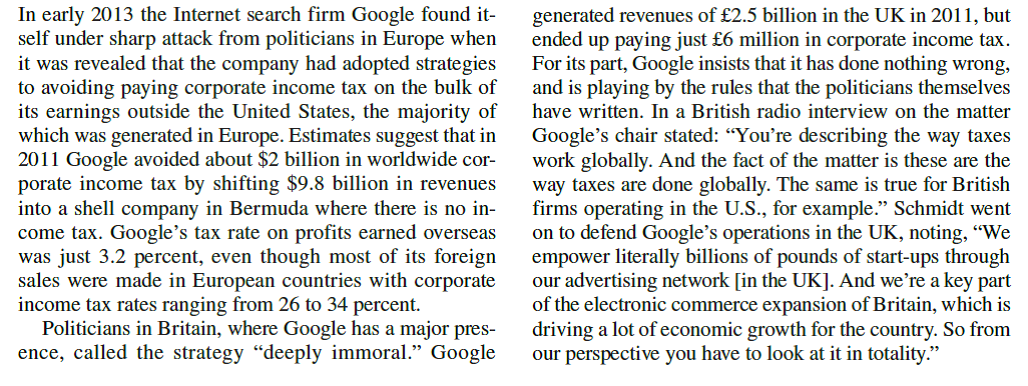
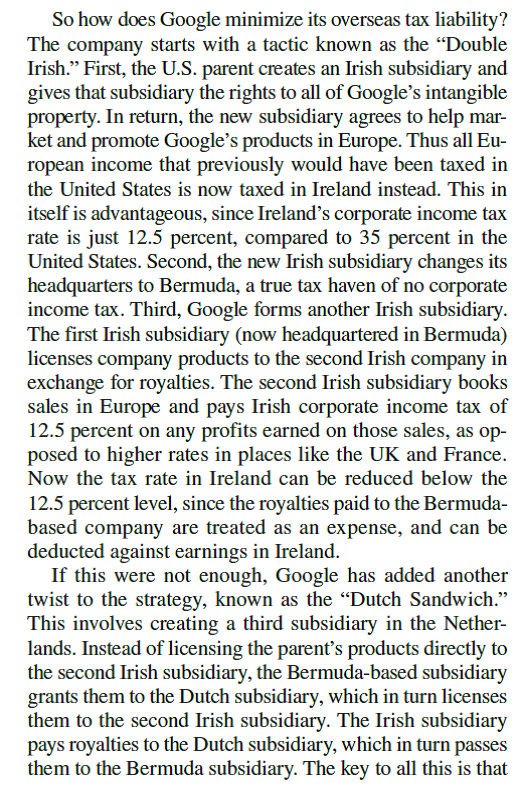
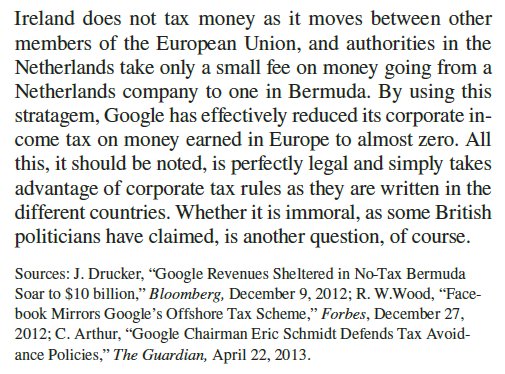
What about the "Dutch Sandwich" move Is this too much tactical game playing for a large company such as Google Explain.



What about the "Dutch Sandwich" move Is this too much tactical game playing for a large company such as Google Explain.

Unlock Deck
Unlock for access to all 10 flashcards in this deck.
Unlock Deck
k this deck
8
You are the CFO of a U.S. firm whose wholly owned subsidiary in Mexico manufactures component parts for your U.S. assembly operations. The subsidiary has been financed by bank borrowings in the United States. One of your analysts told you that the Mexican peso is expected to depreciate by 30 percent against the dollar on the foreign exchange markets over the next year. What actions, if any, should you take

Unlock Deck
Unlock for access to all 10 flashcards in this deck.
Unlock Deck
k this deck
9
Google and Its Tax Strategy
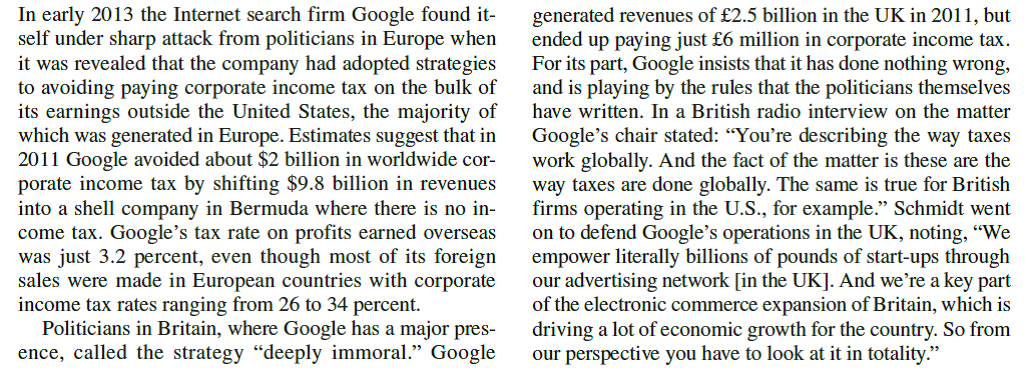
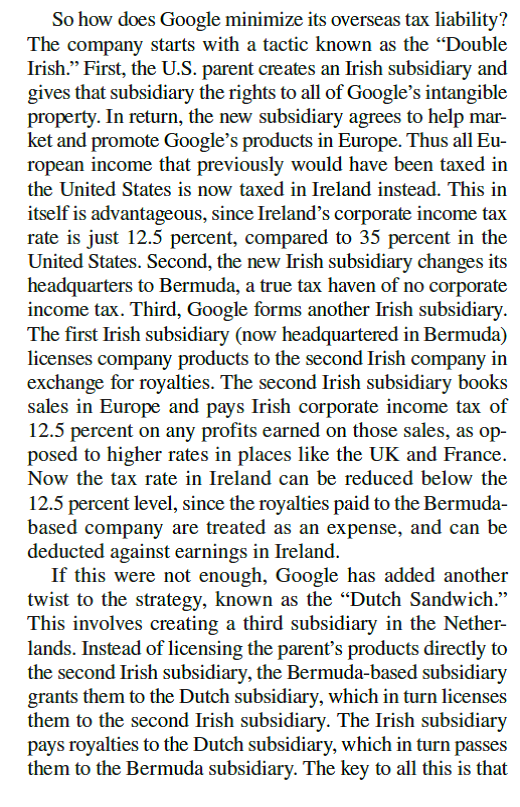
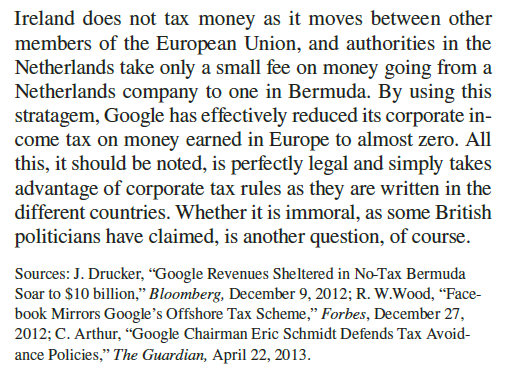
Since there is no income tax in Bermuda, what does Bermuda gain from being "home" to Google's operations in Europe



Since there is no income tax in Bermuda, what does Bermuda gain from being "home" to Google's operations in Europe

Unlock Deck
Unlock for access to all 10 flashcards in this deck.
Unlock Deck
k this deck
10
You are the CFO of a Canadian firm that is considering building a $10 million factory in Russia to produce milk. The investment is expected to produce net cash flows of $3 million each year for the next 10 years, after which the investment will have to close down because of technological obsolescence. Scrap values will be zero. The cost of capital will be 6 percent if financing is arranged through the eurobond market. However, you have an option to finance the project by borrowing funds from a Russian bank at 12 percent. Analysts tell you that due to high inflation in Russia, the Russian ruble is expected to depreciate against the Canadian dollar. Analysts also rate the probability of violent revolution occurring in Russia within the next 10 years as high. How would you incorporate these factors into your evaluation of the investment opportunity What would you recommend the firm do

Unlock Deck
Unlock for access to all 10 flashcards in this deck.
Unlock Deck
k this deck


